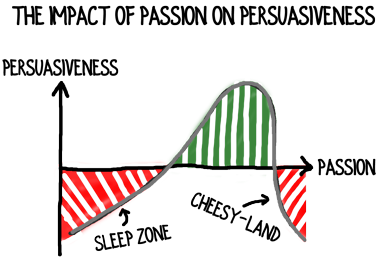It’s easy to be a snoozer. To communicate killer ideas in presentations and articles that are utterly boring. Dull as lichen inside a rock. How do you jazz that up so dishwater concepts sparkle like champagne and your breakthrough insights transfix readers and listeners? I’ll reveal one, easy-but-unusual action that will make your content buzzworthy. (No, not metaphors and similes.)

Recently I read two business books about the same topic, written in the same format. One was an utter grind to finish. Zzzzzz. The other flew by, left me begging for more, and was instantly recommended to half a dozen colleagues. As I pondered the two works, the difference jumped out:
Buzzworthy Content Uses Standing Up Writing,
Not Sitting Down Writing
Sitting Down Writing is what we compose most of the time. We write it sitting down and it feels that way. While it may be practical and high-value, we can recite it while casually reclining and drifting… off… to sleep.
Standing Up Writing contains language you can only say when you’re bouncing on your toes and flapping your arms like cadets in semaphore class. It’s packed with passion and enthusiasm.
It’s the difference between a speech given by someone standing at a lectern (who may as well be sitting) where you take notes then fall into a coma, and one given by a rousing, animated speaker who brings you to your feet and leaves you crackling with energy.
You don’t want to be over the top, of course. If you take it too far, your prospects will be shell-shocked or feel like you’re being as fake and cheesy as a used car salesman in a leisure suit.

But, chances are you can move two giant leaps toward the Standing Up edge of the spectrum without any risk of crossing the line.
The Secret to Standing Up Writing
If you want to produce energetic, lively, irresistible blogs, articles and speeches, then (this is going to shock you)…stand up! Not metaphorically. Not figuratively. Literally.
Before you put pen to paper, pace around your office and mutter ideas out loud to yourself. Be a bit hyperactive. Then transfer that kinetic energy to your writing.
If a phrase or passage is sluggish, get on your feet and wave your arms around while you say it. Play with words and terms, expressing your message in varied ways until the language conveys your dynamic gestures. Then quickly sit back down and type madly. You’ll be striking your fingers against the keyboard so loudly that neighbors will think a woodpecker is attacking. That’s a good sign!
Audiences like passion. They want passion. They BUY passion.
Passionate executives stand up, open their wallets and reach for your hand. And that’s when you stop waving your arms around… for just long enough to close the deal.
What speech or writing has made you stand up and take action?
Text and images are © 2024 David A. Fields, all rights reserved.

 David A. Fields Consulting Group
David A. Fields Consulting Group 

Great tip. I’ve been looking for tips and tools to improve copy, social posts and my blog. I can’t wait to try this. Two other tools people looking to improve and refine their writing are Hemingway and Grammarly.
Right on, Valerie. Let me know whether your writing improves. I’d not encountered the two apps you mentioned, but they look very interesting. Another good idea is to find writing you admire, deconstruct it, and apply the lessons to your own writing. I did this with an article by Chip and Dan Heath (whose books are phenomenal). I literally used different color highlighters to pick out different parts of the article that made their writing effective. Then I started applying those ideas to my own writing….while standing up, of course.
I find this wildly unpersuasive. Not the major premise — that enthusiasm matters to the reader. I get that. If YOU don’t buy your thesis, why will anybody?
But the guidance feels oh so weak. Actionable, sure, but … I just have near-zero confidence this approach will make the slightest difference in the energy of my writing.
(Maybe I already have energy? Maybe I’m in the 1% who are resistant? Maybe it’s an untested method that sounded good to David on a deadline? No way to know without some actual experiences.)
And there’s no good, quick way to test it among ourselves — if I tried writing both ways, I’d probably go out of my way to be super-energetic in my prose while seated, just to be “right.” Confirmation bias doth make self-testing near impossible over the short term.
David, if you have some university study up your sleeve that proves that his works for N% of people, please share. Otherwise I’ll use my own techniques of (a) turning key actions into verbs, (b) making my actors the subjects of my verbs, and (c) picking anglo-saxon root words over latinate words.
Well, Tom, I look forward to hearing your results when you try it. Clinical tests don’t really matter much in this case, do they? All that matters is if it helps you. If it doesn’t, don’t use it… you can always sit back down! (I recommend not listing your chair on Craigslist, just in case.)
If’n I was being all scientific-like, I might point out the neuro-linquistic programming roots of this technique, which are certainly well researched. But I’m not being that diligent. Standing Up writing is based on my own, personal experience which, admittedly, is sometimes described as “alternate reality.” Bottom line: give it a shot
Your other tips for excellent writing are certainly sound. In fact, many echo recommendations I make in my programs. You may also enjoy this blog post: How to be the Stephen King of Consultant
“Audiences like passion. They want passion. They BUY passion.”
AMEN. Authentic conversations trump corporate talking heads any day. Thanks so much for your weekly treats, David.
You’re welcome, and you’re right, Lacey. Inauthentic conversations have negative impact. They diminish your credibility and dampen your long-term ability to win projects. That’s why the stereotype of the used car salesman, with their faked passion, carries such an enduring, distasteful reputation.
Authentic passion and conviction, on the other hand, is extraordinarily compelling. Thank you for injecting that idea into the discussion!9
(BTW, I combined your two comments into one. If you meant to keep them separate, let me know and we’ll restore them as submitted.)
Thanks for straightening that out. You’ve helped me save face. 🙂